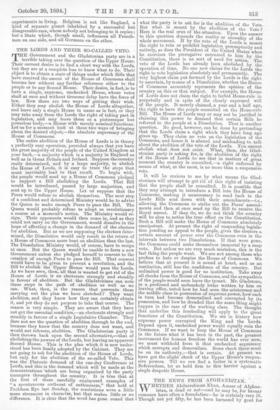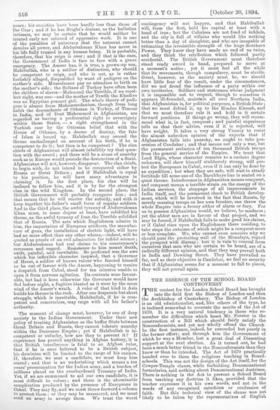THE NEWS FROM AFGHANISTAN.
WHETHER Abdurralunan Khan, Ameer of Afghan- istan, is dead or not—and he may be, for bazaar rumours have often a foundation—he is certainly, very ill. Though not yet fifty, be has been harassed. by gout for years ; his anxieties have been hardly less than those of the Czar ; and if he has Bright's disease, as the bulletins intimate, we may be certain that he would neither be treated early nor relieved of oppressive work. It is one of the penalties of autocracy that the autocrat cannot devolve all power, and. Abdurrahman Khan has never in his life fully trusted in any human being. It is probable, therefore, that his reign is over ; and if that is the ease, the Government of India is face to face with a grave emergency. The Ameer has, it is true, a grown-up son, Habibullah, who is a soldier of distinction, who should be competent to reign, and who is not, as is rather foolishly alleged, disqualified by want of pedigree on the mother's side. Mussulmans pay no attention to birth on the mother's side ; the Sultans of Turkey have often been the children of slaves—Mahmoud the Terrible, if we recol- lect right, was one—and the mother of Tewfik the Khedive was an Egyptian peasant girl. The whole theory of pedi- gree is absent from Mahommedanism, though from long habit the descendants of Othman in Turkey, of Timour in India, and of Dost Mahommed in Afghanistan, are regarded as having a preferential right to sovereignty within those States, — a right strengthened in the Turkish case by the Ottoman belief that with the House of Othman, by a decree of destiny, the fate of Islam is bound up. Habibullah may ascend the throne unchallenged on account of his birth, if he is competent to do it ; but then is he competent? The clan chiefs of Afghanistan will almost infallibly try that ques- tion with the sword ; and there will be a scene of anarchy such as in Europe would precede the destruction of a State. Afghanistan will not, however, disappear. The clan chiefs, to begin with, do not intend to be conquered either by Russia or Great Britain ; and if Habibullah is equal to his position, he will have many advantages in claiming it. In the first place, his clan will be inclined to follow him, and it is by far the strongest -elan in the wild Kingdom. In the second place, the British Government will probably recognise him ; and that means that he will receive the subsidy, and with it keep together his father's small force of regular soldiers. And in the third place, the awful tyranny of Abdurrahman Khan must, in some degree at least, have solidified his throne, as the awful tyranny of Ivan the Terrible solidified -that of Russia. The acts which Englishmen admire in him, the importation of European artificers, the manufac- ture of guns, the installation of electric light, will have had no more effect than any other whims,—indeed, will be quoted as proofs of an evil admiration for infidel science ; but Abdurrahma.n had real claims to his countrymen's reverence and regard. Resistance to him meant death, swift, painful, and inevitable. So profound was the awe which his inflexible character inspired, that a Governor of Herat, a soldier of known valour who fancied himself to be out of favour with the Ameer, happening to receive a despatch from Cabal, stood for ten minutes unable to open it from nervous agitation. Its contents were favour- able, but had it been otherwise the Governor would have fled before night, a fugitive blasted as it were by the mere wind of the Ameer's wrath. A ruler of that kind in Asia builds his throne in the rock. After one desperate but short struggle, which is inevitable, Habibullah, if he is com- petent and remorseless, may reign with all his father's authority.
The moment of change must, however, be one of deep anxiety to the Indian Government. Under their new policy of treating Afghanistan as the buffer State between 'Great Britain and Russia, they cannot tolerate anarchy within the Douranee Empire ; yet if Habibullah is in- competent or unlucky, how are they to prevent it ? If ,experience has proved anything in Afghan history, it is that British interference is fatal to an Afghan ruler, -that if he is once believed to be a British subject, his dominion will be limited to the range of his cannon. If, therefore, we seat a candidate, we must keep him .seated ; and, that is an undertaking which means a ten years' preoccupation for the Indian army, and a burden of millions placed on the overburdened Treasury of India. Yet, if we are summoned to aid our own candidate, it is most difficult to refuse ; and there is the abominable complication produced by the presence of Europeans in Cabul. They may fly, and we must throw forward a column to protect them ; or they may be massacred, and we must send an army to avenge them. We trust the worst contingency will not happen, and that Habibullah will, from the first, hold his capital at least with a hand of iron ; but the Cabulees are not fond of infidels, and the city is full of villains who would like nothing better than a day of slaughter, and who are incapable of estimating the irresistible strength of the huge Southern Power. They know they have made an end of us twice, and they think the retribution which followed partly accidental. The British Government must therefore stand ready sword in hand, prepared to move at a moment's notice ; yet it must feel all the while that its movements, though compulsory, must be sterile. Great, however, as the anxiety must be, we should have little fear of the result, under the circumstances, did we not dread the influence of a party within our own territories. Soldiers and statesmen whose judgment it is impossible not to respect, though to ourselves it appears ill-founded, maintain all over Northern India, that Afghanistan is, for political purposes, a British State; that we must defend it, up to the Hindoo Khoosh, and that we must therefore rule it and hold in it certain forward positions. If things go wrong, they will recom- mend what is, in fact, conquest ; and painful experience tells us that their advice, even if it is rejected, will have weight. It takes a very strong Viceroy to resist the almost unbroken opinion of the experts that if Afghanistan falls into anarchy, we ought to take pos- session of Candahar ; and that means not only a war, but the permanent seclusion of ten thousand British troops from the general service of the Empire. We trust that Lord Elgin, whose character remains to a curious degree unknown, will show himself stubbornly strong, will pro- tect the Europeans in Cabal, even if it can only be done by an expedition ; but when they are safe, will wait in steady fortitude till some one of the 111 arukhzye line is seated on a quiet throne. Interference in Afghanistan means conquest, and conquest means a terrible strain on the energy of the Indian services, the stoppage of all improvements in India itself, and the permanent check to British develop- ment, which will be involved in the fact that Russia, by merely massing troops on her own frontier, can throw the whole Empire into a frenzy either of alarm or fury. For us to possess Afghanistan would, we believe, be madness ; yet the ablest men are in favour of that project, and we may be forced, if Habibullah fails to make good his claims, or if Cabul rises upon the Englishmen there residing, to take steps the outcome of which might be a conquest more or less complete. We, who cannot even conceive why we should pass the protecting wall of the Himalaya, regard the prospect with dismay ; but it is vain to conceal from ourselves that men who are certain to be heard, are of a radically different opinion, and that they may prevail both in India and Downing Street. They have prevailed so far, and as their objective is Candahar, we feel no security that if Afghanistan seems for a moment to fall to pieces, they will not prevail again.





































 Previous page
Previous page